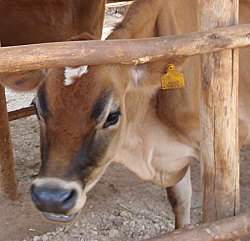
Thousands of these beautiful, life-giving bovines have made their way from as far away as Ireland into the backyards of impoverished families all over the tiny country in the heart of Africa. Once there they first give milk to the family and then through artificial insemination, more cows go to more families.
Donata Mukeshimana feeds six children of her own and four orphans from the cows she has obtained through the program that started in Rwanda in 2004. Beyond daily subsistence, she has also made home improvements and just last week connected to electricity thanks to the money she has made selling milk. Donata is the president of her cooperative, a group of farmers who work together to support one another through the exchange of information, goods and joint marketing efforts.
Heifer International’s mission is to end hunger and poverty while caring for the earth.
In Rwanda, veterinarian Dennis Karamuzi explains, “Milk is part of our diet. If you miss it, you miss yourself.”
A Rwandan born in exile, Karamuzi is the program manager for the country. His day consists of visiting the cows that have been placed, helping the families with any issues they may have with the cows, while trying to gather vital information about the program’s impact.
Down a long bumpy, dusty road from Donata in the Rwamagana district an hour’s drive east of Kigali, Liberata Kayitesi is able to pay for school for her two children and has also been able to improve her home by putting a new more durable façade on her house thanks to her cow.
Liberata is a second-generation recipient. One cow is given to a family or person. That initial recipient is expected to care for the cow, which at the “marrying age” of 18 months will be artificially inseminated. The first offspring of the first recipient must go to another family when it is ready. This is done ceremonially usually twice a year. Recipients must apply and be vetted and from there, it’s a lottery. Names are picked out of a basket to match the number of cows available.
Since a donor does not choose who her cow’s offspring will go to, the process also fosters reconciliation in this country that was dramatically divided by genocide just 16 short years ago.
“Sometimes a cow will go to your enemy,” Dennis says. “It automatically creates a bond.”
Recipients must attend training seminars, grow grass for the cow and build a shelter and exercise area for the animal.
“They must be willing, and able to commit their own resources,” according to Dennis, who explains the first recipients were among the most vulnerable: persons affected by HIV/AIDS, orphans, widows and people affected by extreme poverty. “But we don’t leave out the others.”
In the beginning, Heifer International even provided seeds for growing the various grasses that would feed the cows.
“But once they get started, it becomes their own project,” Dennis says.
It’s not just about the cows, or livestock. It’s about self-reliance and wealth building. After a recipient passes on the one required cow, all others stay with her.
Cooperatives have been formed and milk is sold through the East African Dairy Development program.
With just one cow, Liberata says she is making 50 cents a day selling her excess milk after feeding her children. Donata proudly tells us she doesn’t have to grow her own food to feed her family.
Smiling, she indicates she buys it with the money she makes from her cows. .
In a country of subsistence farmers with an annual average income of $300, many thousands of people are slowly milking their way out of poverty and into good health.
But there’s an added benefit to all of this, Dennis says, sniffing the manure-scented air, “When they get cows, they feel life again – just smelling the cows.”





